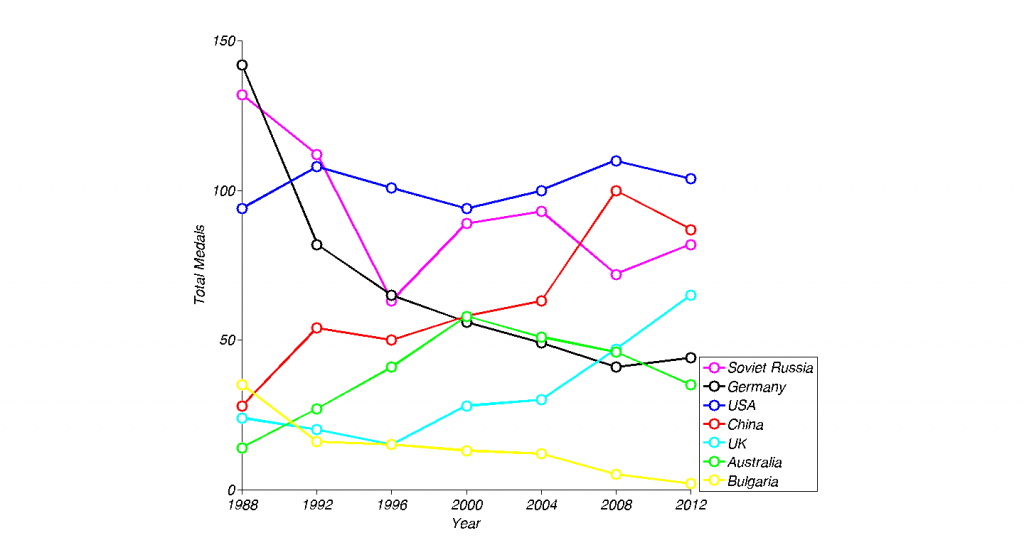
Figure 1. Total medals per nation and year
Now this is fun: Over at Pascal’s Pensées, Lascap talies medal totals since 1988 among five big medal-winning countries and finds some interesting trends. Most interesting to my eyes: Communism pays; home-field advantage counts for a lot.
The communism/central funding advantage shows not just in China’s rise, but in the most startling negative result: the free-fall in medals won by Germany (the descending black line). In 1988, Germany — the stats in the chart include both West Germany and the East German team of the time, heavily funded and apparently heavily drugged — kicked everybody’s bums. The German medal count then dropped by over a third before the next Olympiad, in 1992, for that was period in which the wall fell and communist East Germany, amid chaos, could not devote its usual resources to the Olympiad; by 1992, it was re-united with West Germany. The fall slowed down then (between 1992 and 1996) and was checked in this most recent Olympiad, held in London. Soviet Russia, meanwhile, went through a roughly similar but more wiggly gyration. China’s been coming on strong.
As to home-field advantage, Lascap argues that it rises less from psychological factors than from increased resources poured into training and facilities. This reflects the two factors that Lascap concludes drive medal counts in general: the means to train top athletes (population, money, expertise); and the national will to commit the resources, which of course rises as a country anticipates hosting the games. Means and motivation — ain’t it ever so?
Below is some explanation straight from Pensées; I recommend going there to read the whole fascinating thing, with more good graphs and such.
Two major trends become apparent:
1. Communism/central planning boosts medal counts. It is hard to distinguish between the two, as basically all remaining central planning regimes are also communistic in nature. The dramatic decline in medals from countries that abandoned communism (Germany, Bulgaria, Soviet Russia as well as others not shown) contrasts with the continued success of countries that retained it (China, and others not shown, e.g. Cuba, North Korea). The effect is very real, but it is unclear how to interpret it. Do communist countries value the olympics more (perhaps as an outward sign of pride)? Does sports performance lend itself to central planning? The German results highlight that this might be so. In 1988, East Germany won 2.5 times the medals that West Germany did, despite the West having almost 4 times the population at the time. In other words, based on population alone, East Germany was outperforming West Germany by a factor of almost 10:1. Note that this happened in spite of the famed abundance of economic resources in the west, compared to the east.
2. The outcomes of the UK, Australia and China show that countries that host the olympics see their results boosted not only in the year in which they host the olympics itself (which could be due to some kind of home-advantage), but also in the run-up to the olympics (maybe reflecting an increased allocation of resources on athletics in a given country in preparation for the big event, perhaps not uncorrelated with the fact that they were awarded the olympics in the first place). This is consistent with a steep rise of the UK performance even before the 2012 olympics was given to London in 2005 and likely due to direct investment from the proceeds of a lottery program. Also, the performance of Australia suggests that hosts might be able to put some persistent sports infrastructure in place, which allows them to retain most – but not all of their gains. In this sense, it might be interesting to watch the Chinese performance in the future. The rise of China has led to much insecurity in the US, but it remains to be seen whether this rise is sustainable, or if the strong Chinese showing in 2008 was simply due to a confluence of several of these factors.
So wasn’t a lot of satellite state funding also provided by the Soviet Union back in the day.. it was one of the many ways it bankrupted Old-Style Communism in the end.. trying to show the world how great it was in games and such. So East Germany/Bulgaria funding was heavily subsidized or taken from other areas to push it ahead of others. New Style Communism is awash in cash these days so it has no problems with worrying about bankruptcy.